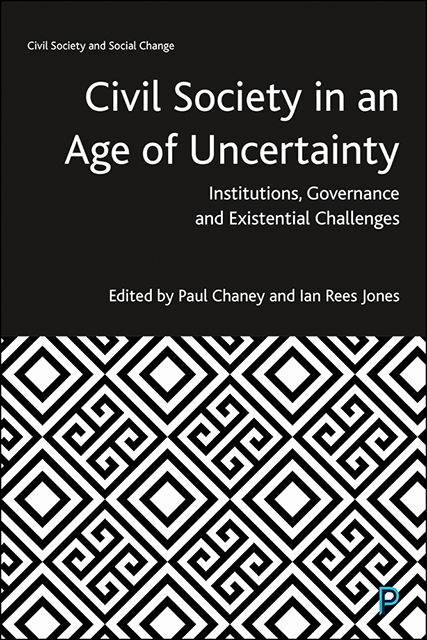Book contents
- Frontmatter
- Contents
- List of tables and figures
- Notes on contributors
- Acknowledgements
- 1 Introduction: Locating civil society
- 2 Existential challenges
- 3 Civil society and the governance of city region economic development
- 4 Civil society, pandemic and the crisis of welfare: exploring mixed economy models of welfare in domiciliary adult social care in a devolved UK
- 5 The contemporary threat to minority languages and cultures: civil society, young people and Celtic language use in Scotland and Wales
- 6 Digital threat or opportunity? Local civil society in an age of global inter-connectivity
- 7 Democratic decline? Civil society and trust in government
- 8 Xenophobia, hostility and austerity: European migrants and civil society in Wales
- 9 Meeting the challenge? Prospects and perils for civil society in the twenty-first century
- Index
6 - Digital threat or opportunity? Local civil society in an age of global inter-connectivity
Published online by Cambridge University Press: 16 June 2023
- Frontmatter
- Contents
- List of tables and figures
- Notes on contributors
- Acknowledgements
- 1 Introduction: Locating civil society
- 2 Existential challenges
- 3 Civil society and the governance of city region economic development
- 4 Civil society, pandemic and the crisis of welfare: exploring mixed economy models of welfare in domiciliary adult social care in a devolved UK
- 5 The contemporary threat to minority languages and cultures: civil society, young people and Celtic language use in Scotland and Wales
- 6 Digital threat or opportunity? Local civil society in an age of global inter-connectivity
- 7 Democratic decline? Civil society and trust in government
- 8 Xenophobia, hostility and austerity: European migrants and civil society in Wales
- 9 Meeting the challenge? Prospects and perils for civil society in the twenty-first century
- Index
Summary
Introduction
Writing in the 1960s, the cultural theorist Marshall McLuhan foresaw the emergence of a ‘global village’ as technology dismantled the significance of distance (McLuhan 1964). The metaphor of the village not only conveyed the proximity of social and economic relations in the new global age, but also indicated the forging of a new universal space of social consciousness, identity and belonging, and collective action. In the ensuing decades, the advent of digital technologies extending far beyond those envisaged by McLuhan has facilitated the articulation of a ‘global civil society’ (Keane 2003), underpinned by a growth in global consciousness and a globalisation of values, and mediated by transnational institutions and non-governmental organisations (NGOs) (Arts 2004). Most recently, social media technologies have permitted new forms of transnational social mobilisation that can bypass the mediation of institutions and NGOs, as individuals around the world connect and engage directly and instantaneously, further embedding the ‘villageness’ of global civil society.
It would be tempting to see the corollary of this rise of global civil society as the diminution of local civil society, with the global and the local pitted against each other in a zero-sum game. Certainly, scholars have documented the erosion of traditional structures of civic engagement and lamented the loss of ‘community’ in parallel with globalisation. Robert Putnam (2000), for instance, described the erosion of bonding social capital and local civil society structures in American communities in his seminal study Bowling Alone, which he attributed in part to the atomisation of society under the spell of television and the mass media, even as digital technology was in its infancy. Charts in the appendix of Bowling Alone meticulously detailed the falling membership of conventional civic and local social organisations, but also the expansion of national or international campaigning groups. Other observers similarly noted a shift towards more individualistic, nationally mediated and passive forms of social and political participation, coining terms such as ‘armchair activism’ and ‘cheque-book participation’.
Yet, the popular narrative of the emasculation of the local by the global has long been countered by alternative discourses that have emphasised globalisation-as-hybridisation over globalisation-as-homogenisation (Robertson 1992; Pieterse 2003) and pointed to the relational constitution of localities.
- Type
- Chapter
- Information
- Civil Society in an Age of UncertaintyInstitutions, Governance and Existential Challenges, pp. 111 - 132Publisher: Bristol University PressPrint publication year: 2022



